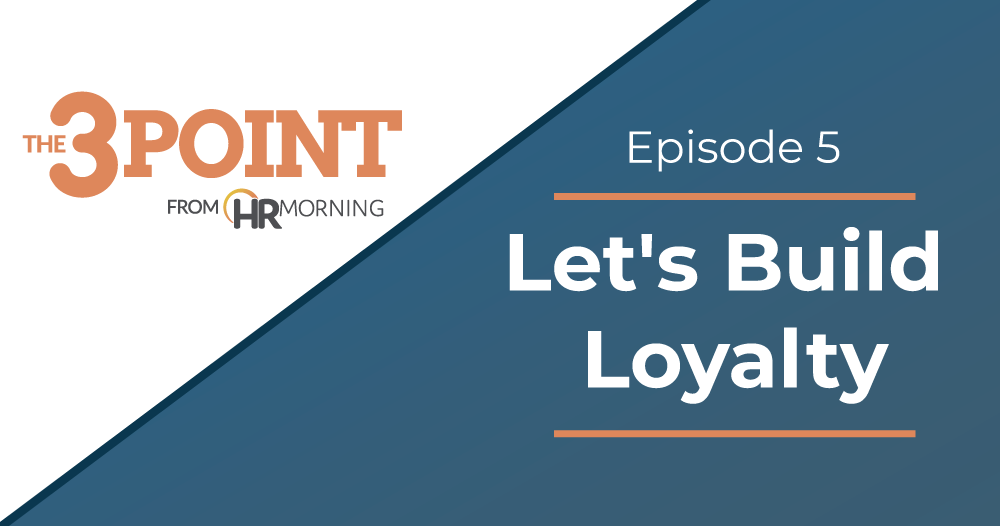What if you could get your best employees to stay — forever?!
OK, OK, aside from retirement — you have to let go at some time — why not aim for a better-than-average turnover rate? More importantly, why not aim for a better-than-average turnover rate with your best employees?
So let’s build loyalty.
While the Great Resignation seems to be over, loyalty is particularly important today because:
- 3.6 million people left their jobs this past quarter,
- the average tenure is four years, and
- good employees make good companies.
Let’s build loyalty from ground-up
As a general rule, employee retention rates of 90% are considered good. But you want to look at the smaller picture: Retention rates for the best employees should be above 90%.
Here, in our 3-Point from HRMorning video series, we talk with HR practitioners and industry experts who’ve managed to keep and elevate a loyal staff. One of our pros shares the four questions her team regularly asks employees to make sure they’re meeting needs and staying aligned.
Watch and listen for the top three tips in this episode. And then step away ready to implement at least one quickly.
Transcript (edited for clarity):
Don’t you wish your best employees would stay forever?
The good ones stay, the bad ones move on.
But it seldom seems to work that way, right?
Even though it seems the Great Resignation is behind us, The Department of Labor found there are more than 4 million people who left their jobs this year. Average tenure is just over four years.
Surely HR doesn’t want to lose employees, especially the good ones, at that clip.
Big reason: churn is expensive. Gallup found it can cost nearly a person’s salary just to replace them. Plus, turnover causes issues with morale, harmony and workflow.
So how can HR lessen turnover and build employee loyalty?
For one, work with senior leadership to set the standard. That’s according to Steve Paskoff, CEO of ELI.
Paskoff: Let me say something about senior leaders. They lose something when people come to work and quit on the job. They lose something when people who they’ve had for a long time and perform well get disaffected. They’ve got to see that how people are treated is a business issue as important as anything else they do. And they’ve got to bring it into their DNA — theirs and their organization’s.
And you can never underestimate the power of a state interview.
Tedesko: We ask four very simple stay interview questions: What’s going well? What could we improve? Who should we recognize? What should I know? And those four questions give us so much information about what’s important to the organization. But it also creates an opportunity for us to listen and empathize and truly, sincerely care for our employees. And that’s the basis for everything else an organization is going to do.
Lauren Priori found that customizing roles for employees works
Priori: So the two main things I do is: 1) I really get to know my team and I fit the job around them. So there are no specific cookie cutter roles. Every job is customized to each person, their personality. You do personality tests, get to know them as a person. And 2) I just have a really, really great culture and managers that kind of keep that culture going.
Employee loyalty isn’t just about eliminating headaches for HR. Loyal employees take on new roles, build culture and move the company forward.
So to build loyalty:
- Manage up: Ask your leaders to actively get involved in creating a loyalty plan.
- Meet up: Do quarterly interviews. Ask four quick questions. Act on the answers.
- Match up: Try to customize roles so employees feel like they’re exactly where they should be.
Increase employee loyalty and you can anticipate better business results all around. Now is the time to focus on getting employees to love where they work.


